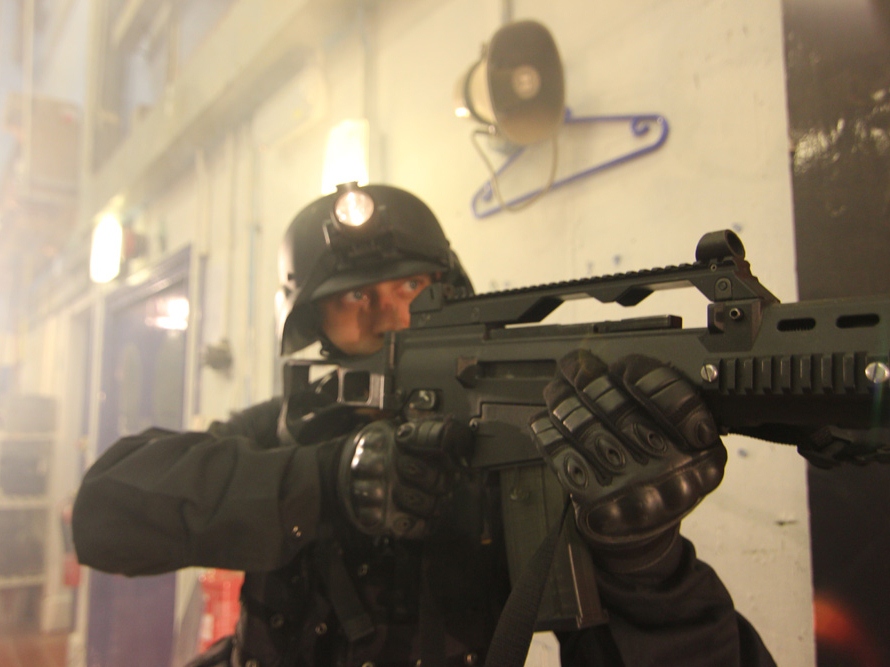This week installment of The Military Channel’s “Black-OPS” focused on the hunt for Abu Musab al-Zarqawi, and the relentless assault on al-Qaeda In Iraq (AQI) under the command of General Stanley McChrystal.
The show highlights how the United States lost an effective terror hunter after a journalistic hit piece forced the general’s resignation.
Unlike the previous episode, “Taking Down bin Laden,” which went out of its way to characterize President Obama as engaged in the decision making involved in Operation Neptune Spear, “Assault on al-Qaeda” only mentions President George W. Bush once in passing, focusing instead on the US Joint Special Operations Command (JSOC) operators and their new commander, General Stanley McChrystal.
Al-Zarqawi was a disciple of Osama bin Laden, a vicious murderer and the leader of AQI. He seemed to be able to launch or direct attacks on Shiah targets around Iraq but was always one step ahead of the U.S. forces pursuing him. When AQI released a video of American hostage Nick Berg, a 26-year old communications engineer from Pennsylvania, being beheaded personally by Zarqawi with a long blade in May of 2004, the stakes were upped and Zarqawi became the new, most wanted terrorist in Iraq.
McChrystal, a “maverick new general,” was assigned to be the new commander of the Joint Special Operations Command, and he had “radical new ideas” about how to find and kill Zarqawi. He brought all the intelligence agencies under one roof at JSOC’s command center and banned all turf wars.
Instead all information – no matter how seemingly insignificant – would be shared and deposited into a central database where analysts would process it quickly so that operators from the various special forces could deploy to take the fight to the enemy and destabilize the AQI network.
In addition, McChrystal set up an interrogation facility at his base right next to his operations center. His interrogators pumped captured terrorists for information, which was immediately added to the intelligence database. McChrystal divided the country and gave his operators areas of responsibility around Iraq. In the north, the Army’s 75th Ranger Battalion operated as Task Force Red. In the west, the Navy SEALS operated as Task Force Blue and in the center of Iraq, Delta Force operated as Task Force Green – along with elements of the British SAS, operating as Task Force Black.
Whereas traditionally Special Forces would engage in two or three operations per year, now they would be embarking on multiple operations every night. The concept was to process intelligence, act on it within 24 hours, and then bring additional intelligence back from each raid. The continuous loop of raids and new intelligence would make it impossible for the members of AQI to move their safe houses and avoid coalition forces.
The terror network’s supply lines were cut, their bomb makers were taken out of action and the net began to close on Zarqawi.
Finally in spring of 2006, the interrogation of a mid-level detainee reaped a critical piece of information that led McChrystal and his operators to Zarqawi. They got the name of his spiritual advisor and began watching him 24/7 with what McChrystal called “the unblinking eye,” Predator drones, disguised SAS operators and other surveillance means.
They followed the spiritual advisor to an area near Tikrit where Zarqawi revealed himself. McChrystal determined that he couldn’t risk a firefight in broad daylight and couldn’t wait for nightfall, as Zarqawi had a knack for slipping away. So instead he immediately ordered 2 F-16s that were on patrol to proceed to the location and bomb the house where they had located the al-Qaeda In Iraq leader.
Minutes later the house exploded and when the SEALs arrived they found Zarqawi barely alive. He died in the hands of a US Navy SEAL, who was the last thing the terrorist ever saw.
In focusing their attention on General McChrystal the producers revealed, intentionally or not, what a tremendous loss to the U.S. war against terrorist groups and insurgencies in general and al-Qaeda in particular it was when Michael Hastings and Rolling Stone magazine published its “The Runaway General” piece in June of 2010.
As this episode of “Black-OPS” says, McChrystal was a “maverick” with “radical new ideas” about how to fight insurgencies and terror networks. The very things that made McChrystal a true terror warrior were the very things that were his undoing when he allowed Hastings to spend unguarded and supposedly off-the-record time with him.
McChrystal wasn’t political and he certainly wasn’t politically correct. Being part of the Special Operations community, he functioned a little differently that your typical general and his demeanor was a little less polished than some. But Hastings and Rolling Stone Magazine didn’t care about damaging U.S. security or destroying the career of a man that spent his life honorably defending the very freedoms they eventually used to destroy him.

COMMENTS
Please let us know if you're having issues with commenting.